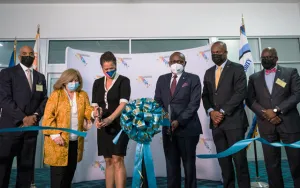
“Forward Upward Onward Together”
The Bahamas’ motto encapsulates the vision shared with the United States as Lynden Pindling International Airport (NAS) in Nassau, Bahamas, welcomed the first international TSA PreCheck® lane.
“Bringing TSA PreCheck to the Bahamas was possible because of the close collaboration between the U.S. and Bahamian government and exemplifies a common and abiding interest in strengthening aviation security around the world,” said TSA International Operations Western Hemisphere Regional Director Karen Hanlon.
With the Bahamas one of the most visited tourist destinations, having a TSA PreCheck lane will make traveling more convenient and efficient at NAS, the fourth busiest airport in the Caribbean.
Hanlon, Bahamas Deputy Prime Minister Chester Cooper, U.S. Embassy Charge’ d’Affaires Usha Pitts, TSA Representative for the Bahamas Dwaine Murray and other prominent transportation stakeholders celebrated the groundbreaking achievement during a special ceremony at NAS.
"This considerable milestone speaks positively to the benefits of our two countries working together to reinforce and prioritize matters of mutual global aviation security, safety, traveler efficiencies and other mutual benefits,” said Cooper.
During the ceremony, Pitts said, “What we're commemorating here today, what we're recognizing is the fact that all those American citizens who come to the Bahamas know now that they're not coming to a country that is just number one in natural beauty, but also number one in terms of ease of travel."
With travel volume high between the two countries and NAS having a U.S. Customs and Border Protection (CBP) Preclearance checkpoint as an extra layer of security, the Bahamas was the clear first choice for TSA PreCheck.
Preclearance is where CBP Officers inspect travelers in a foreign country before passengers board flights headed to the U.S.
Murray noted the Bahamas has a strong compliance oversight, is relatively low-risk and recently installed multimillion dollar technology upgrades to the checkpoint and baggage screening areas. Upgrades include a new advanced imaging technology machine, computed tomography X-ray, explosive trace detector and bottle liquid scanner.
“This obviously gives the location the ability to run a more efficient checkpoint, adapt a better risk management posture and increase the passenger experience,” said Murray.
Murray said a large percentage of U.S. citizens who travel to Nassau are eligible for TSA PreCheck. Nearly 4 million visitors travel to the Bahamas yearly, with about 2 million flying to Nassau. Roughly 85% are U.S. citizens and 23% have Known Traveler Numbers (KTNs) through the DHS Trusted Traveler Programs.
A permanent dedicated TSA PreCheck lane allows low-risk travelers with a KTN the opportunity to receive expedited screening for flights leaving NAS on nine participating airlines.
Murray said the induction of TSA PreCheck is a prime example of the great partnership between international aviation authorities and TSA’s International Operations.
“International Operations will continue these collaborations with international partners, as TSA is committed to being a reliable partner – to hold healthy and frank dialogues, to share information, to innovate, to develop new capabilities and to build a security culture designed to strengthen global aviation security and to stay ahead of evolving threats,” he said.
TSA officials hope the first international TSA PreCheck lane will serve as a model for the expansion of TSA PreCheck at other Preclearance locations.
“With the continued popularity and effectiveness of TSA PreCheck, I am confident that Trusted Traveler Programs will remain key pillars of transportation security for years to come,” said Hanlon.
By Ariana Diaz, TSA Strategic Communications and Public Affairs



